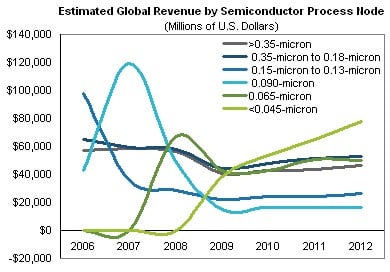Moore's Law
could still be applied ie. we still have the
capability, it's just that it is less likely to apply in practice now.
I think merrillmck covered it quite nicely, re the parallel processing (actually quite hard to write the software to utilise it) & also re the economics (less money in the economy, & less demand for greater speed).
One additional point which hasn't been mentioned is the fact that to create ever faster chips, it is becoming increasingly expensive to develop the technology capable of fabricating the newer chips. The manufacturers are really pushing the boundaries of what is possible now.
This graph highlights the problem ;
It illustrates that as the chip geometries have to become increasingly smaller in the future (in order to increase clock speeds) then the chips will have to be kept in production for much longer periods of time in order for the manufacturers (Intel, AMD etc) to get a return on their ever-increasing investment.
This article covers it in detail ;
http://www.theregister.co.uk/2009/06/21/isuppli_semi_process_forecast/
Finally though, don't forget that Moore's Law can easily become kick-started again. All it would take is 1 revolutionary breakthrough in CPU technology, whether that involved going 3D with the chip's structure, leaving silicon based chips behind completely, or something else we haven't even considered. Then, the speed race could continue again un-checked!

Please click my Reputation button
(at the corner of this post) & make me

-it costs you nothing!
If I've traded services/credits with you, please remember to leave
iTrader Feedback. Thanks.


